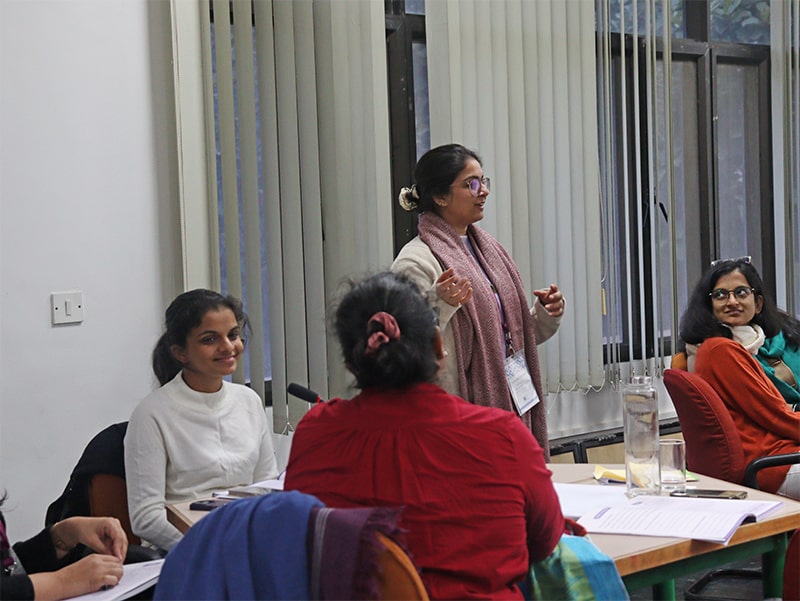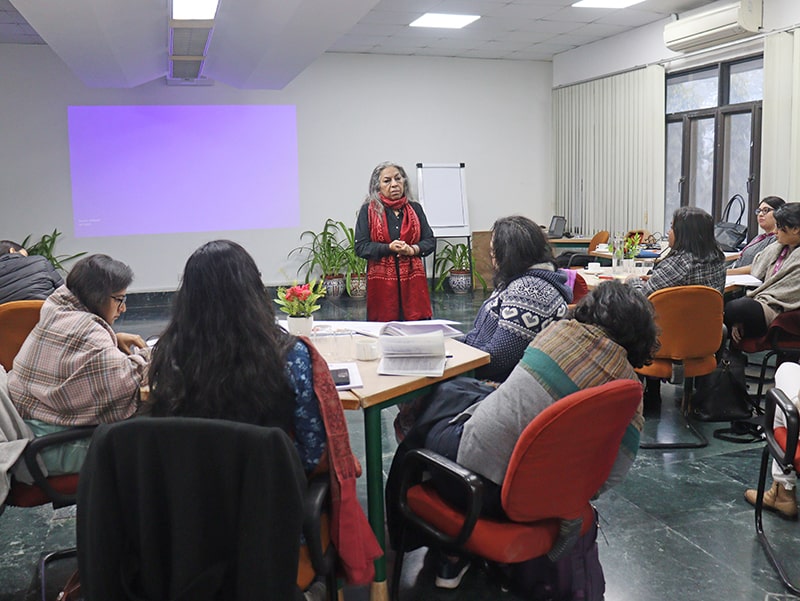


Date : Apr 5 , 2024 | By Ananya Sharma,Dr. Shradha Roy
‘A mentor is someone who allows you to see the higher part of yourself when sometimes it becomes hidden to your own view.’
–Oprah Winfrey
In the ever-evolving landscape of professional growth, women, particularly those in mid-career roles, encounter a myriad of unique challenges that often hinder their advancement. This also holds true for women leaders in the social sector, who find themselves navigating through a maze of systemic biases, entrenched gender norms, societal stereotypes, and towering expectations.
But how do these obstacles impact their trajectory towards success? Let’s break it down. From limited access to coveted leadership positions and facing unequal compensation to underrepresentation in decision-making roles and encountering barriers to career growth, women confront numerous hurdles along their career paths. Moreover, societal stereotypes and expectations further compound their struggles by undermining their credibility and confidence as leaders.
What we’ve learned from working closely with over 100 women in our program is a common thread: these women are hustlers! They’ve built their careers on sheer hard work and early wins, without much thought for the long haul. During our interviews and chats, we’ve heard this echoed time and again – many of them struggle to paint a picture of where they want to be down the line. It’s like they’re cruising without a map, which makes it tough to navigate the twists and turns of career growth. Internally, they’re wrestling with self-doubt, imposter syndrome, dynamics of the workplace, and the never-ending juggle of work and family.
‘If you cannot see where you are going, ask someone who has been there before.’
– J Loren Norris
Picture this: you’ve got someone who understands your struggles, knows the lay of the land, and helps you map out your path forward. That’s the power of mentorship that is tailored to women’s unique challenges.

We’ve seen how mentorship plays a pivotal role in supporting women’s professional development in various ways:
Clarity and Goal Setting: Mentors help women articulate their professional goals and aspirations, encouraging them to write them down for clarity and accountability. Through personal experiences shared, mentors inspire mentees to envision their career trajectories more concretely.
Participant: ‘My focus has been more on individual leadership and development. My mentor was very quick to help me understand how to pace and time my ideas. She identified my mental blocks and was able to direct me to rethink what I needed to do immediately and in the long term. She was extremely analytical in her approach, which I greatly appreciated!’
Perspective Building: Mentors offer diverse perspectives and insights, helping women identify their leadership styles and areas for growth. By assigning perspective-building tasks and facilitating reflective practices like journaling, mentors enable mentees to gain clarity on their strengths and areas needing improvement.
Participant: ‘In our chats, we dug deep into my leadership journey, breaking it down to figure out my next moves for progress. Additionally, we’ve talked about my aspirations and how to match them up with my strengths’.
Creating Safe Spaces: Mentors establish safe and comfortable environments for open dialogue, where women feel empowered to share their thoughts and challenges without fear of judgement. This supportive atmosphere fosters trust and enables mentees to explore their feelings and concerns freely.
Participant: ‘Her deep understanding of being someone who has been in similar shoes, understanding the challenge of an introvert and contextual responses from that perspective have been helpful for me’.
Skill Development: Mentors provide tailored guidance and support to address specific challenges and enhance skills necessary for career advancement. Whether it’s learning to communicate effectively, manage time efficiently, or navigate professional transitions, mentors offer practical tools and strategies to help women overcome obstacles and thrive in their roles.
Participant: ‘I was able to consolidate my thoughts, feelings on the leadership shift task I had taken up. The conversation helped me to find more granular nuances and threads to reflect on and practise further to support skill gaps’.
Networking and Building Connections: Mentors offer insights into building professional networks and adopting gender-inclusive practices, empowering women to expand their connections and advocate for themselves effectively. Through conversations about networking skills and experiences, mentees gain valuable insights into building meaningful professional relationships.
Participant: ‘I was able to discuss a few personal inhibitions and limiting beliefs with my mentor and it was helpful to understand her perspective. Moreover, we discussed the importance and different types of networking which work for people with diverse backgrounds and this really resonated with me. I now know how I could take my first steps in this area’.
Emotional Support and Resilience: Mentors offer emotional support and encouragement, helping women navigate personal and professional challenges with resilience. By providing perspective on stressful situations and recommending resources like books and tools for personal development, mentors equip mentees with strategies to overcome obstacles and maintain a positive mindset.
Participant: ‘I was experiencing some personal emotional turbulence, but my mentor came up with this idea to treat it as if it was a professional one and this shift changed the perspectives and outcomes altogether. This approach enabled me to understand my saboteurs and sages’.
It is through a mentor’s support, encouragement, and occasional tough love that women feel empowered to step up, seize opportunities, and make their mark in their careers and lives.

But, how and where can women leaders seek mentors?
The ILSS Emerging Women’s Leadership Program is designed to equip women with the knowledge, skills, and support they need to succeed as leaders in the social sector, driving positive change and advancing social impact.
At the heart of the program’s transformative approach lies a deep understanding of the intricate interplay between power dynamics and patriarchal structures, which frequently impede women’s advancement. Through robust mentoring support, The ILSS Emerging Women’s Leadership Program seeks to dismantle these gender-based barriers and empower women with the skills and strategies needed to navigate and surmount them adeptly for women to feel more confident and clear as they approach the progress intentionally and strategically.
Through mentoring, participants not only cultivate essential leadership skills but also build a robust support system that extends throughout the duration of the program, and beyond. Empowered with newfound knowledge, confidence, and a network of mentors, women emerge as catalysts for change in their respective fields, driving progress and diversity in leadership.
In conclusion, mentoring is not just a component of The ILSS Emerging Women’s Leadership Program; it is the cornerstone which empowers mid-career women to reach their full potential and enact positive change in the world.
Apply now for The ILSS Emerging Women’s Leadership Program
Date : Jul 4 , 2024
Date : Jun 27 , 2024
Date : Jun 15 , 2024
Date : Apr 5 , 2024
Date : Mar 28 , 2024
Date : Jan 25 , 2024
Date : Mar 22 , 2023
Date : Mar 15 , 2022